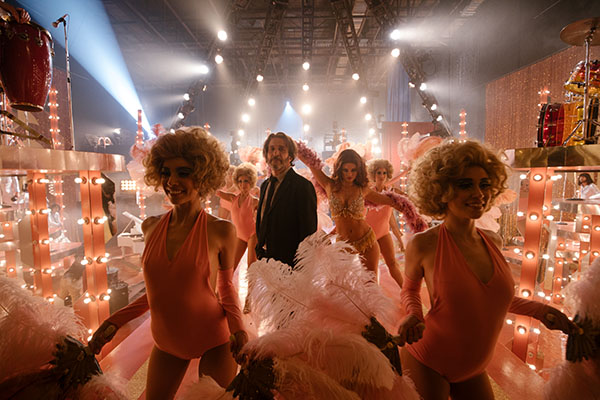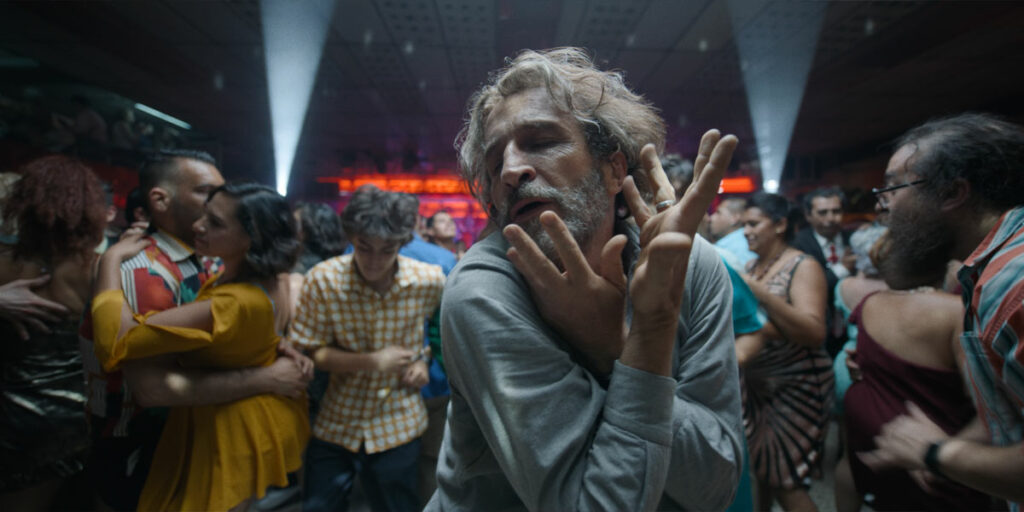Existentialism cloaks Alejandro G. Iñárritu’s fascinating, intoxicating, and visually resplendent Bardo, False Chronicle of a Handful of Truths.
The fact that Bardo, False Chronicle of a Handful of Truths (Bardo, falsa crónica de unas cuantas verdades) is Alejandro G. Iñárritu’s first film to be shot in Mexico since 2000’s Amores Perros gives you a hint at where the Academy Award-winning director’s head is at. It is also no coincidence that Iñárritu himself left Mexico with his family 21 years ago, a timeline that our protagonist also follows in his latest. In this deeply personal, highly reflective epic, Iñárritu ruminates on an array of thoughts and themes, from immigration, heritage, family, and mortality. Bardo’s true-to-life ambiguity grounds the film in realism despite its experimental tone, and its inner beauty and existential musings mark it out as a thought-provoking wonder, one that loses its footing at times but always challenges us as viewers to widen our gaze and our minds.
Iñárritu’s conduit-of-sorts in Bardo is Silverio (Daniel Giménez Cacho), an award-winning Mexican journalist and filmmaker who has lived in Los Angeles for the past two decades. After being named as the recipient of a prestigious award, he returns to Mexico with his family, encountering old friends and family. It is a trip that sends Silverio into a spiral of questions about his own life’s path. His memories, dreams and biggest fears leak into the present day, as Iñárritu freely moves from dream to reality with a breathless ease. Snippets of conversation or sounds from within Silverio’s memory seep into the present, and Bardo continues on this fascinating streak of experimentation for its entire 152-minute runtime. It’s likely that the 22 minutes cut from its original 174-minute screening at Venice has massively helped Bardo – as stylistically impressive as it is, 2 and a half hours will push you right to the limit, but not past it.
Shot in stunning 65mm by acclaimed DOP Darius Khondji (Amour, Uncut Gems), Bardo is indisputably one of the most visually impressive films of 2022 so far – perhaps even of the (very young) decade. It is ravishing in its beauty, constantly surprising in its splendour, and impressive in how it draws out wonder and turmoil from the everyday. Iñárritu’s penchant for one-shot takes is present, albeit less so than in Birdman (2014) or The Revenant (2015), giving Bardo a free-flowing nature akin to floating through a dream. Wonderful scene transitions allow this film to have an almost unfaltering flow. When you shoot this high stylistically, there will almost inevitably be lapses: a couple of moments of awful, cloying CGI almost ruin some otherwise stellar moments, and two scenes in particular stand out as being invasive and unnecessarily disturbing. Yet, more often than not, Bardo’s singular, unrelenting style compliments Iñárritu’s musings so well. It is a style that won’t be for everyone – it might even alienate some viewers – but if you are swept up by it, the rewards will be rich.

Ultimately, Iñárritu is the beating heart of Bardo. Some have noted that it’s a film for him and not for audiences, and whilst it’s true there is a certain level of self-indulgence to it – when is there not, in a piece as reflective as this? – it feels unfair to label Bardo a project of arrogance or selfishness. Iñárritu bares his soul on the screen, and his own struggles with identity, heritage, and what it means to be Mexican in this modern world are articulated with such admirable intensity and passion. More universally, notions of family, grief and mortality will strike a chord with most; in Iñárritu’s case, he channels his difficulty at moving on from the death of his son in the 1990s, who passed away just days after he was born. Silverio moves through many of the same stages that Iñárritu has gone through as an adult, and is vividly brought to life by Daniel Giménez Cacho (Memoria). He becomes Iñárritu, voicing all his concerns, thoughts and emotions with a mesmerising performance of humour, intensity, pain and wonder.
Admittedly, Bardo might be too long for its own good, with Iñárritu perhaps as unclear on his own life as he is on what to cut from the film. This ambiguous, slightly messy formula reflects life though, and represents the never-ending tumble of emotions that humans experience. Bardo opens on the shadow of a man running and then floating over a desert, similarly to the introduction in Federico Fellini’s 8 1⁄2; Iñárritu’s film doesn’t reach the same heights as Fellini’s masterpiece, but its similarly challenging, surrealist look at a film director’s complex inner mindset remains fascinating and poignant. In true self-reflective form, Bardo contains scenes that heavily reference and critique both its existence as a film and its director; it’s an irony that is not lost on us, and most certainly not lost on Iñárritu either.
BARDO, False Chronicle of a Handful of Truths is now available to watch on Netflix.

